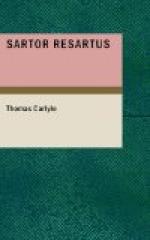Thus, in answer to a cry for solid pudding, whereof there is the most urgent need, comes, epigrammatically enough, the invitation to a wash of quite fluid AEsthetic Tea! How Teufelsdrockh, now at actual hand-grips with Destiny herself, may have comported himself among these Musical and Literary dilettanti of both sexes, like a hungry lion invited to a feast of chickenweed, we can only conjecture. Perhaps in expressive silence, and abstinence: otherwise if the lion, in such case, is to feast at all, it cannot be on the chickenweed, but only on the chickens. For the rest, as this Frau Grafinn dates from the Zahdarm House, she can be no other than the Countess and mistress of the same; whose intellectual tendencies, and good-will to Teufelsdrockh, whether on the footing of Herr Towgood, or on his own footing, are hereby manifest. That some sort of relation, indeed, continued, for a time, to connect our Autobiographer, though perhaps feebly enough, with this noble House, we have elsewhere express evidence. Doubtless, if he expected patronage, it was in vain; enough for him if he here obtained occasional glimpses of the great world, from which we at one time fancied him to have been always excluded. “The Zahdarms,” says he, “lived in the soft, sumptuous garniture of Aristocracy; whereto Literature and Art, attracted and attached from without, were to serve as the handsomest fringing. It was to the Gnadigen Frau (her Ladyship) that this latter improvement was due: assiduously she gathered, dexterously she fitted on, what fringing was to be had; lace or cobweb, as the place yielded.” Was Teufelsdrockh also a fringe, of lace or cobweb; or promising to be such? “With his Excellenz (the Count),” continues he, “I have more than once had the honor to converse; chiefly on general affairs, and the aspect of the world, which he, though now past middle life, viewed in no unfavorable light; finding indeed, except the Outrooting of Journalism (die auszurottende Journalistik), little to desiderate therein. On some points, as his Excellenz was not uncholeric, I found it more pleasant to keep silence. Besides, his occupation being that of Owning Land, there might be faculties enough, which, as superfluous for such use, were little developed in him.”
That to Teufelsdrockh the aspect of the world was nowise so faultless, and many things besides “the Outrooting of Journalism” might have seemed improvements, we can readily conjecture. With nothing but a barren Auscultatorship from without, and so many mutinous thoughts and wishes from within, his position was no easy one. “The Universe,” he says, “was as a mighty Sphinx-riddle, which I knew so little of, yet must rede, or be devoured. In red streaks of unspeakable grandeur, yet also in the blackness of darkness, was Life, to my too-unfurnished Thought, unfolding itself. A strange contradiction lay in me; and I as yet knew not the solution of it; knew not that spiritual music can spring only from discords set in harmony; that but for Evil there were no Good, as victory is only possible by battle.”




